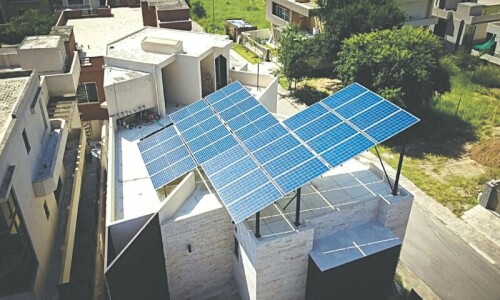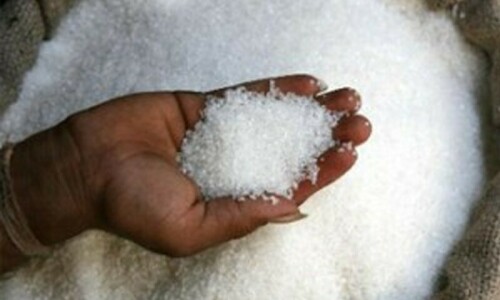KARACHI, Dec 31: Perhaps the most striking statement made by President Pervez Musharraf, in his address to the nation, a day before handing power to the elected representatives was that there had been no reduction in poverty and unemployment. But he claimed that the country had hit the road to prosperity as a result of the economic structural programme pursued by his government over the three years. The poor and the unemployed were asked to be ‘patient’ and wait for the benefits to trickle down to them.
The government of Mir Zafarullah Khan Jamali enters the new year with an understanding that its credibility would depend on convincing the people that continuation of economic policies of the previous government, do not mean sacrificing the development and prosperity goals.
The elected government has inherited a financially stable but fundamentally a weak economy. An economy with highest ever foreign exchange reserves, but one that lacks the capacity to absorb its manpower in gainful employment and is incapable of supporting a decent living standard for the majority of its people. Any indiscreet move, at this point, by the new government has the potential to put Pakistan in more difficult situation.
The government, at the very outset, will have to tackle the compelling issues of poverty and rising income disparity in a fashion that gains of stabilization programme, followed over the last three years — decisively at a high social cost — are not lost. It will have to resist the temptation to embark upon populist tendencies that results in trade off of fiscal discipline and good governance practices for measures culminating in short-term political gains.
Many economists believe that the military government’s economic agenda, followed over the three years, was all but, lop-sided. A recent official publication looks like having let the cat out of the bag. The first quarter 2002 report of the State Bank of Pakistan, released this Monday, states that there is a need to focus now on what it calls ‘the next phase of reforms’. In this phase it asserts that “the development expenditure on infrastructure, education, health, water and sewage, Khushhali programmes in the districts, irrigation, and water storage and conservation can be enhanced without fear of breaking the fiscal targets.” The report of the central bank, however, stops short of explaining why over the three years of the first phase, the economic interests of majority of ordinary people were ignored. And even more intriguing is the question that if the cost was unavoidable to gain fiscal stability, why was it not equitably distributed amongst all stakeholders in the country. Was it fair to trample over the poor and the downtrodden and let rich and powerful — those who could take the brunt, be spared? The fact that income disparity actually increased over this period speaks volume of how actually social justice was compromised to attain certain objectives without disturbing the vocal elite.
To be true to its democratic content, the Jamali government is expected to keep equality aspect of any future economic policies nearer to its heart than its predecessor. The current State Bank report makes all the right noises about the future. It says: “The monetary and credit policy is being geared to channel banking sector resources towards agriculture, small and medium enterprises, housing, construction, consumer financing and micro credit”. These sectors, it argues, employ the majority of labour force and have the potential of creating highest number of jobs. “Increased public sector investment and higher private sector credit to these labour-intensive sectors, and not budgetary subsidies are key to revival of growth, employment generation and poverty reduction,” says the country’s central bank. All these policy suggestions do carry a great deal of weight but the greatest challenge confronting the elected government — many economists confirm — is how to channelize the rush of idle capital floating in the economy into long-term investment.
“The market is extremely liquid, thanks to the unprecedented inflow of dollars,” says an economist at an investment house. And he adds that if one-half of those could be channelized in long-term investment in industrial and agricultural sector, Pakistan could hit the road to economic transformation and prosperity. “If that happens the country can expect to attain the lost goal of 6-7 per cent growth rate in medium-term,” says another analyst. But the million dollar question is, will the country’s economic managers be able to do that in the ‘second phase’ of the economic stabilization programme?
In a nutshell, economic well being and prosperity of majority of the people who have been asked to wait patiently to see the end of their poverty, would depend on the pace of investment — whatever the source of money — public, private or foreign. As long as the Large Scale Manufacturing (LSM) sector is weak and agriculture development allowed to be hindered by known impediments, chances of a turnaround in the economy — at least in the near term — are, all but slim.











































Dear visitor, the comments section is undergoing an overhaul and will return soon.